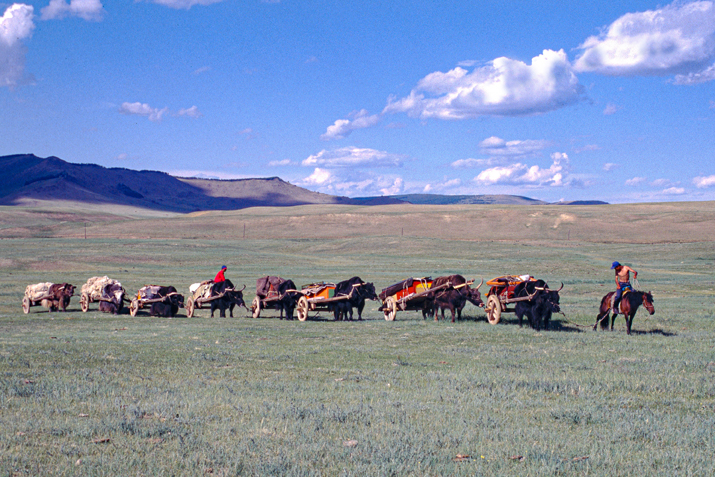
Mourning for Mogi
N 50°50'370'' E 100°14'117''
Day: 95
Sunrise:
07:59
Sunset:
18:07
As the crow flies:
22,40
Daily kilometers:
30,00
Total kilometers:
965
Soil condition:
Meadow, forest floor, gravel, ice, snow
Temperature – Day (maximum):
5°C
Temperature – day (minimum):
minus 0°C
Temperature – Night:
minus 7°
Latitude:
50°50’370”
Longitude:
100°14’117”
Maximum height:
1800 m above sea level
Time of departure:
12:15
Arrival time:
18:00
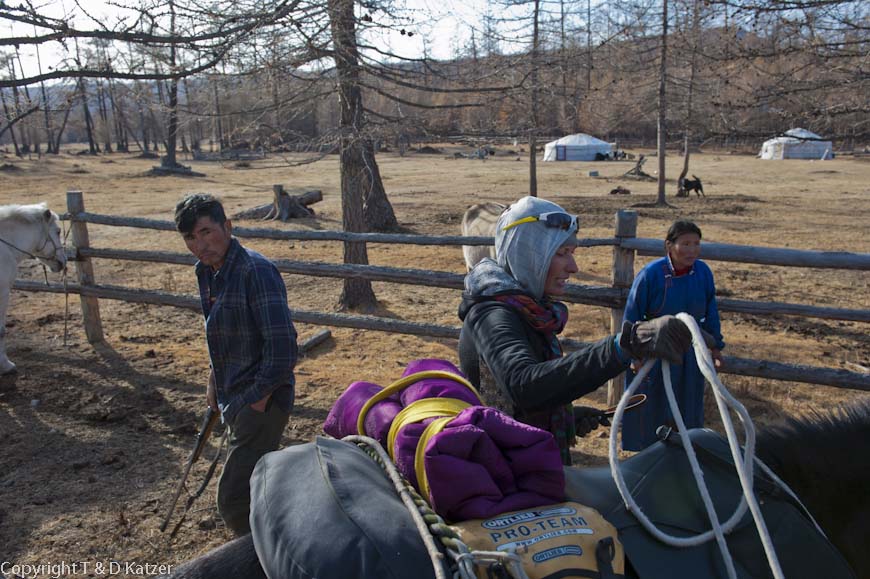

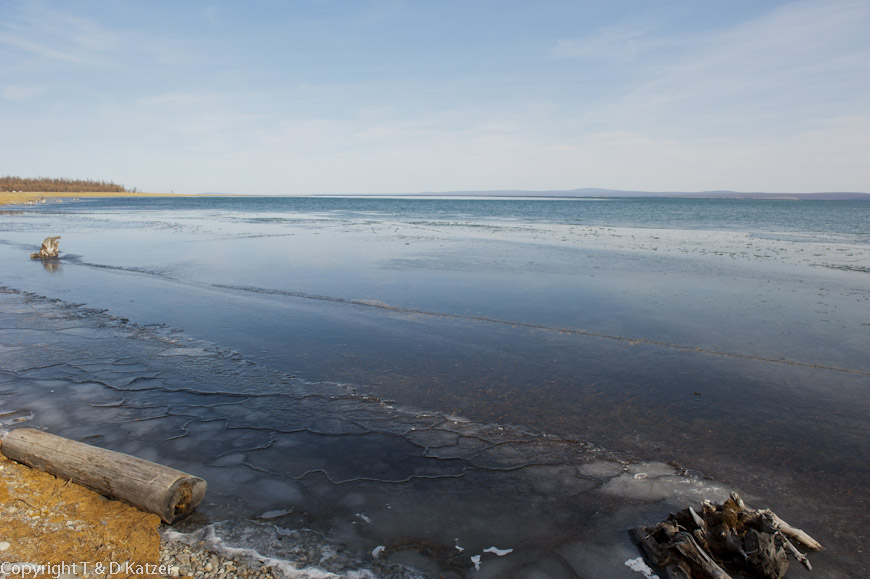
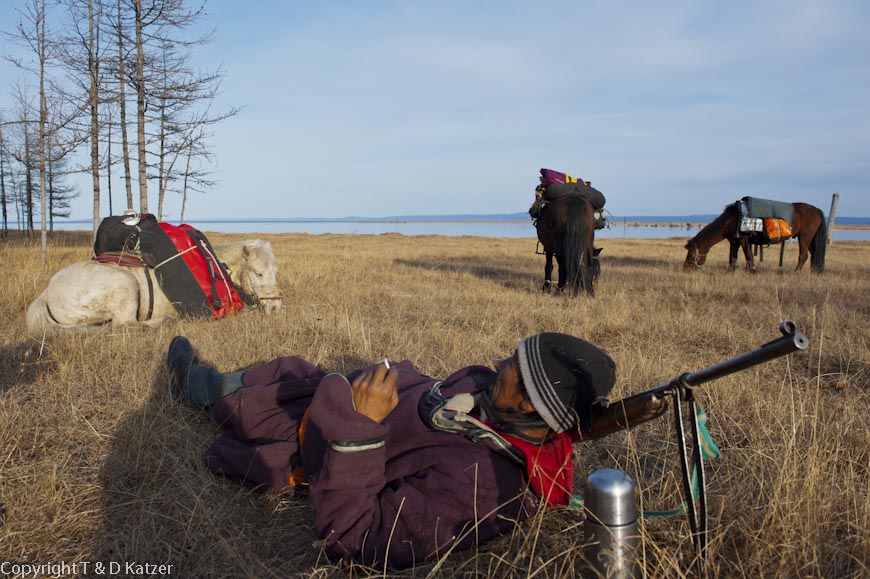
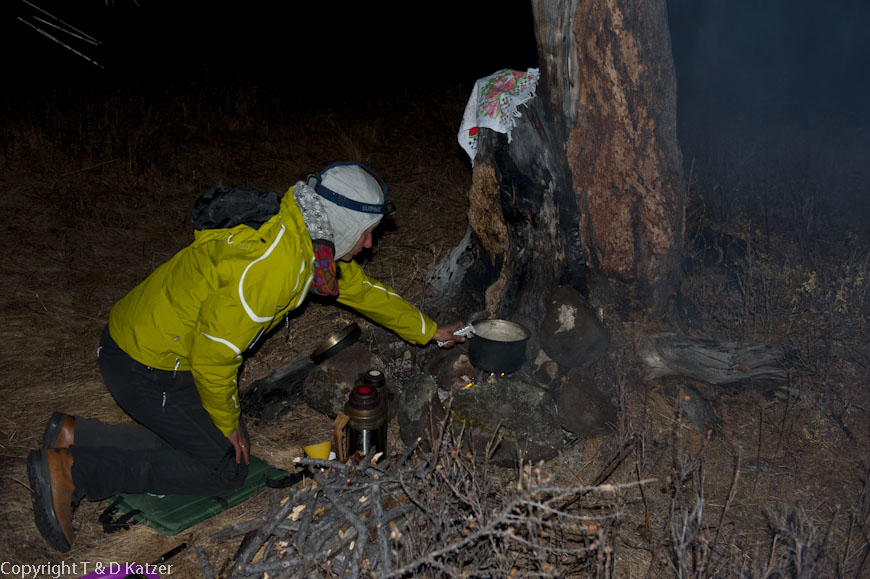
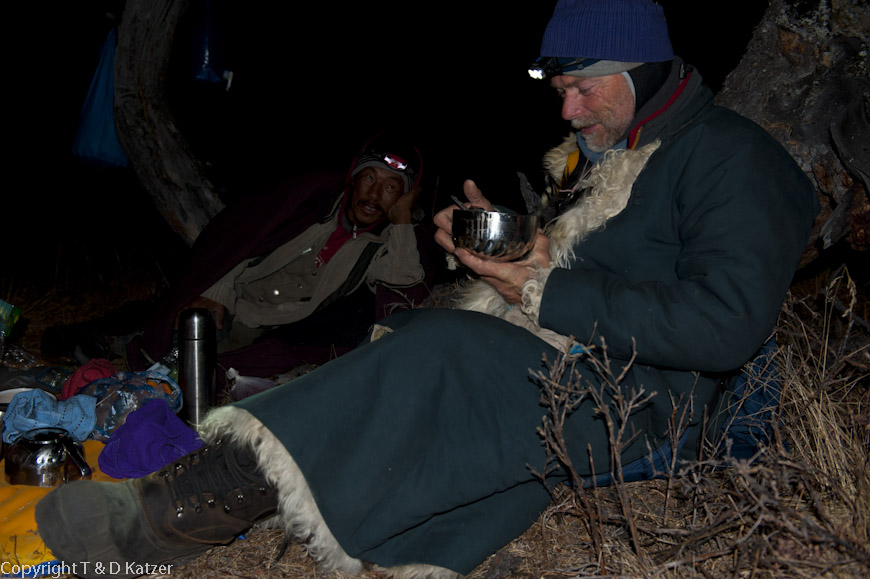
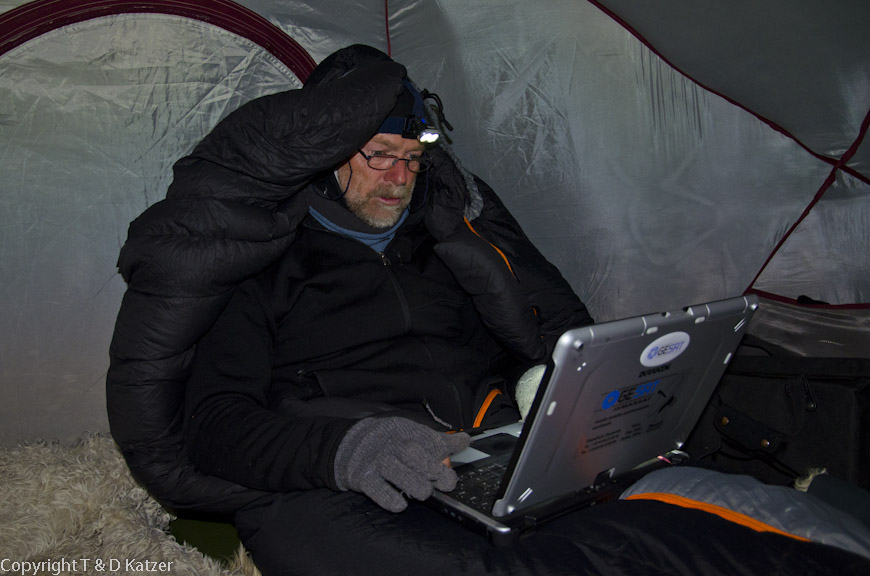

At minus 7 °C, the night was pleasantly warm. We are surprised by this, as the locals say that it gets a little colder every day. Perhaps we will be lucky enough to experience a warm winter after all.
Today we continue our journey on the gravel road built for tourists, which winds along the banks of the Khuvsgul. We plan to cover 30 kilometers. A feasible target due to the easy terrain. We trot over the hard surface. My lumbar vertebrae are making themselves felt from all the trotting. However, I am now able to support my weight with my thighs. This means that I no longer plop into the saddle like I did at the beginning of this horse journey. This is only possible because I have built up muscles in the meantime that I didn’t have before.
As in the last few days, Mogi runs dutifully alongside us. The freedom is good for him. Running around makes him more relaxed, which is why he no longer feels the need to chase everything that moves.
The gang of dogs is still with us. On the contrary, we think there are even more than yesterday. At the moment I count three more four-legged friends with Mogi and the young black dog. Suddenly they spot something in front of us and race off. Mogi leads the way as the leader of his followers. The only thing missing is him waving the flag banner during the attack. I can’t yet see what the pack has done as Bilgee gallops off. “Sheep!!!”, Tanja’s roar hits me in the limbs. I can actually see them now. “Here, take it!” I shout to Tanja, throwing Bor’s lead rope to him, while I press my heels into Sar’s flanks and gallop after Bilgee. Two dogs are chasing a group of rushing sheep. Bilgee follows them, putting his horse into a precarious right turn to push the dogs away from their attack. Ice and chunks of earth fly through the air. I race straight on. The same direction Mogi took. “Come on Sar! Faster! Faster!”, I shout as I see Mogi driving a large billy goat onto a patch of ice next to the lake. Even before I get to the action, Mogi bites the goat’s butt. It roars terribly and tries to escape, but it’s too late. Mogi is beside himself in his rage for blood and pulls at the buck. “Faster!” Oh man Sar faster!” I shout desperately and see the buck slip on the ice and collapse, bleating. By now I’m standing on the edge of the ice, not daring to go a meter further because of the slippery surface. “Mogi! Mogi!!! No! Stop!” I shout one command after another at the top of my lungs. A large shepherd dog also comes running up and keeps Mogi in check. He lets go of the buck, which is still wailing terribly. He stands beside his victim, who is desperately trying to get back on his feet. At this moment, a youth comes storming down an embankment towards us and shouts at me from afar. “We’re going to shoot your dog. That fucking animal!” I understand as he shouts and shoots Mogi incessantly with an imaginary gun. It’s only minutes before a man armed with a rifle rushes up. Before I know it, he inserts a cartridge, fires and aims at our dog. “Tschu!”, I shout quietly in Sar’s ear, driving him between the gunman and Mogi in a fraction of a second. Even though I understand that he would like to shoot Mogi, I can’t just let him. The man runs around me and starts again. I quickly pull Sar around and get back into the line of fire. I am aware that I am playing a risky game because the shot could easily come off and hit me. The annoyed shepherd puts his rifle down. A woman, probably the shooter’s wife, hurries over and reinforces the bulwark against us and the dogs.
Bilgee and Tanja also arrive in the meantime. A nasty battle of words begins, which Bilgee parries calmly and amicably. Mogi, his young dog friend and another handsome male dog stand there during this time and are probably unaware of the danger to their lives. In the meantime, Bilgee has stopped the two other dogs from snatching one or two of the family’s sheep. He therefore provided a great service to the people here. “The dogs don’t belong to us,” he explains to the Mongolians around us, who are drooling louder than before. None of those present takes any notice of Bilgees. On the contrary, they insult him according to every trick in the book. As the other dogs are not wearing collars, they are not of interest. But Mogi, who tore down the billy goat, remains in focus. While the family shouts us down and the man tries to take Mogi’s leash out of Tanja’s hand to send him to dog heaven, I search the ice for the billy goat. He has disappeared. Obviously the poor creature has recovered from its shock and made it off the ice.
We now ride to the family’s yurts. They are right next to the gravel road. When we get there, we have to undergo a barely bearable clamor which is humiliating and insulting in the worst way. “Why do you want to shoot Mogi? The other dogs were just as involved. They’re not our dogs. They live here. They’re a constant danger to your herd!” I try to make myself understood with sign language. Nobody reacts. The evil-looking man wants to snatch the leash from Tanja’s hand again. But she clutches the braided leather strap tightly. Again he strides around Tanja to put a bullet in the dog. This time Tanja intervenes.
We are not sure what to do. We can’t go on with a dog like that. He tugs at the lead all day long and demands Tanja’s full attention. Sometimes he almost pulls her out of the saddle. It would be nice to let him run around freely, but he is a city dweller and wants to chase everything that moves. Preferably bleating sheep and bleating goats. He does not want to wear a muzzle. That is a problem. Here they would shoot him straight away and the problem would be solved. But under no circumstances do I have the heart to accept that. But how do we get out of this situation? Apparently there is a law in Mongolia that says that any dog that bites or even kills a sheep will be shot.
The topic of money is soon on the table. So that’s what it’s all about. You don’t get anything from wild dogs and since bullets are extremely expensive in Mongolia, you don’t want to waste them on stray dogs. “70,000 tugriks! (40,- €) We’ll get 70.000 Tugrik!”, the woman is shouting at us so loudly that my ears are literally ringing. I’m still sitting in the saddle and am downright apathetic, not knowing how to react or how to resolve this nasty situation peacefully. Paying 70,000 Tugrik is an absurdity. We already had that. We would pay and they would keep the goat. So what do we pay for if we don’t get the animal? Even if we are the guilty parties here, we don’t want to be blackmailed and threatened. “We don’t have any money,” I say. “We’re getting 70,000 Tugrik!!!” the woman shouts at me and I’m amazed that she’s not foaming at the mouth with her bawling. “Look what they have. They have money! Hand it over!” she shouts while her husband stands next to her with a loaded gun. “Our billy goat is dead and you have to pay!” she continues to shout. “We have no money. We spent everything on food in Khatgal,” Bilgee backs us up. “70,000!” is the adamant reply.
“Show me the dead goat!” says Tanja and bends down to go into the fenced-in area of the two yurts. The family follows her, while I am still sitting in the saddle as if paralyzed. Tanja returns a few minutes later. “The billy goat is running around, happy as a lark. We examined the spot where Mogi bit and found nothing. Mogi only got her thick fur. He is obviously unharmed. None of the people here could show me a single bit of blood. They’re lying. They want money, that’s all,” she explains. “70.000! We’re getting 70,000!” it screeches over and over again. “For what?” I ask. No answer. The man puts the cartridge back into the barrel of his shooting stick and tries to shoot Mogi again. In the meantime, I feel a tremendous amount of anger welling up inside me. Dangerous trouble that heralds a volcanic eruption. “I’m not going to be fucking blackmailed,” I mutter, pull my SLR out of my bag and take a photo of the man with the gun, his awful wife and his son. That somehow has an effect. In the short term, they are afraid the picture might prove how they threaten us with a gun. “Let’s go,” says Bilgee, mounts his horse and rides off.
Now, standing alone, we don’t know what to do. As I turn my horse to follow Bilgee, the gunman puts his hand on my reins, as he has done before. A mistake. A gross mistake. He seems to sense my combustible energy. Before I say anything, he pulls his hand away again. Bilgee, meanwhile, returns. He offers to shoot the dog. The family responds. I get a shock. Will Mogi really be shot now? Oh no. Please don’t.
Bilgee rides off again. Prudent and calm, I turn silently like a fish. Then I get out of the saddle and run after Bilgee as if in slow motion. Tanja follows me. Bilgee stops. He ties his horse to a thin larch tree. Takes his rifle off his back while my heart contracts. “Please don’t. Oh God, what am I going to do now? What should I do? I can’t let that happen? Or can you? Is it Mogi’s fate? Doesn’t a city dweller belong in the wilderness? Oh, what am I going to do?” I pray as Bilgee inserts a bullet, places the rifle in a fork of a branch so that I can aim more accurately and aims at the young black bitch. She has now become quite trusting, lying three meters away from the horses in the frozen grass and looking at us trustingly. Then the shot rings out. The dog flinches, fatally hit. She stretches out all her limbs in agony. Then she breathes out again and goes limp. I’m standing there like I’m in the wrong movie. I feel sick to my stomach. Tears run down my cheeks. The bitch certainly didn’t expect that when she followed. She wanted to come to us for protection, food and affection. She wanted to bond with the humans to survive the winter and now she has paid for her trust with her life. I am quite sure that she was not there when the sheep were attacked. Nor did she support Mogi in his hunt. She was simply in the wrong place at the wrong time. A classic victim. Silently, Bilgee takes a rope from the saddle, ties the dog’s hind legs together with it and pulls her into the nearby forest. Then he calmly stows the rope back on the saddle and slowly turns his head towards us. “Come quickly. Let’s keep moving. Don’t turn around. Quickly,” he murmurs, whereupon we leave the scene behind us and follow the slope. The gunman runs after us. His nagging family stayed behind in the yurt camp. It looks like he doesn’t know how to deal with the situation at first. He has received his blood sacrifice. Get his revenge. Not on the dog that bit his goat, but on a dog from the pack. The bitch is undoubtedly a victim. That won’t be enough for him. Surely he still wants Mogi dead. But now another dog has fallen. He didn’t expect that. Bilgee probably told the people there to shoot Mogi and simply took the wild bitch to save Mogi’s life. His clever move could work.
“Is the man still behind us?” I ask Tanja, not daring to turn around. “Yes, he’s still hot on our heels.” “Oh no. Please end this drama as peacefully as possible,” I pray to Mother Earth, aware that it has already cost one life. “Then let him shoot me in the back,” Tanja shouts as if in response to my thoughts. Man, what a terrible situation. And it was such a perfect day. Once again, Mongolia’s mood strikes completely unexpectedly. The distance between the man and us increases slightly. We decide to get into the saddles and ride at the same time. We slowly increase the pace. It must not look like an escape. A slight bend in the path takes away our view to the rear. We seize the moment to trot off. Within a few minutes, we disappear behind another bend. Now a person without a horse can no longer catch up with us.
We’ve been trotting along for two hours now. Not on the dust track for a long time. We follow the banks of the Khuvsgul. The lake begins to freeze over in some places. It goes over ice, turf and small streams. I turn again and again in the saddle. No chasers. Why should you? Nevertheless, there is an unpleasant feeling behind us, we have left something behind that I don’t like at all.
For the first time on the trip, we discover a lush pasture that has not been eaten bare. We settle down exhausted in their tall grass. “No one will find us here,” I say to Tanja. “Do you think they’re after us?” “I don’t think so, but it feels good to know that there’s a big gap between those greedy people there and us and that there are no traces to follow. Who knows what these people come up with? In the end, they think of visiting us in the camp at night,” I reply.
“Denis?” “Yes.” “We can’t keep Mogi with us anymore. Do you realize that?” “Hm, I kind of do.” “He’s a sheep killer. That gets us into a lot of trouble all the time. Apart from that, he’s also in danger,” says Tanja thoughtfully. “What do you suggest?” I ask, a little unsettled. “We should leave him in Tsagaan Nuur with Ayush or send him from there to Saraa in Mörön. If Ayush, Saraa’s cousin, doesn’t take the dog, Saraa will certainly have a use for him. Mogi has already attacked sheep and goats four times on this trip. That’s just not on. You can see how people react to that. Besides, it’s expensive to have a hunter like that as a companion.” “Hmmm.” “As soon as Mogi is off the leash, he finds something to hunt and bite, even here where there are supposedly no small animals. It’s a disaster. I just can’t connect with him. Apart from that, he pulls like a madman on the lead. I just don’t feel like it anymore. He spoils part of the trip for me. On top of that, we can’t take proper photos because of him. You can’t just get off the horse, unpack the camera and press the button. First I have to tie Mogi down somewhere. And if there’s nothing to tie him down to, how am I supposed to take pictures?” I hear a devastating array of arguments that can’t be refuted. “Well then, let’s do it this way. We’ll either leave him with Ayush or send him to Mörön in a vehicle,” I concede, feeling a lump rise in my throat.
I take over Mogi on the rest of the ride. Tanja would rather lead Sharga and Bor than the dog constantly rushing forward. Now I’m the driver because boron won’t run without it. Mogi actually rushes forward. After a short time, my left arm starts to ache due to the constant pulling. When branches or tree trunks come his way, he dodges them so stupidly that he suddenly finds himself on the other side of the trunk and his leash is torn out of my hand. While Bilgee and Tanja trot on, I am now forced to get out of the saddle, call Mogi over, take the lead again and heave myself back into the saddle. Because of today’s events, I’m already in a bad way, so it takes a lot of self-control not to transfer my anger onto the poor dog. It doesn’t take long and I can completely understand Tanja. Mogi is indeed more difficult to lead than two pack horses. Nevertheless, I love the dog, although I have to ask myself why. So far, he has indeed caused far too much trouble.
We only reach a hidden camp at sunset. It is a lush pasture surrounded by larch forests. “From tomorrow, the food situation will be even more difficult than before. When we leave Khuvsgul, we have to go into the mountains. There’s hardly any grass there,” says Bilgee and is therefore all the more pleased to have come across an abundance of food here.
Mogi is tied to a root away from us. He looks meekly over at us. It seems to me that he suspects what Tanja and I have decided. It’s as if he knows full well that the emotional connection to Tanja has been broken today. A connection that could have been of great importance for him and his future. He doesn’t make a sound, is crouched down and blinks almost fearfully at us. None of us really pay any attention to him that evening. The anger was too great. I, too, sit hunched over in my deel, leaning against a tree trunk. I was so excited that the Hex shot me in the back, which is why I took a Voltar tablet. I look at Mogi and suddenly I have to cry. Hiding my tears, I mourn the loss of our dog. I would have loved to have him by our side for the whole trip and then take him back to Germany with me. He is a city dog and not yet used to outdoor life. We hadn’t been able to invest enough time in training him. How could you? On this horse expedition, we are busy from early in the morning until late at night. Apart from that, it is simply not clear to me how you can get a dog to lose its innate hunting instinct? Is that even possible? Interestingly, it is precisely this breed, whose name is “Do Khyi” (translated as “tied dog”), that is also used to herd sheep and goats. In Tibet, they are used as monastery guard dogs. The Do Khyi or Mastif are known for their robustness and endurance, but above all for their ability to work in extremely cold climatic conditions. People like this dog breed for its pronounced loyalty and sense of family. Hm, he really does show us his loyalty and sense of family. He knows that we are a team. That the three of us belong together on the trip. Does he also know that his life was hanging by a thread today?
We look forward to your comments!

